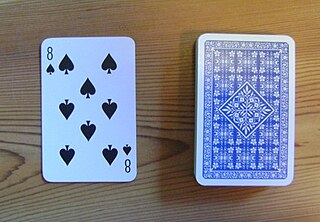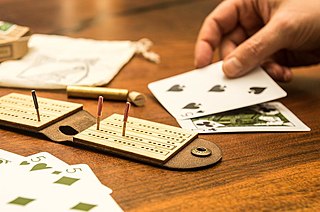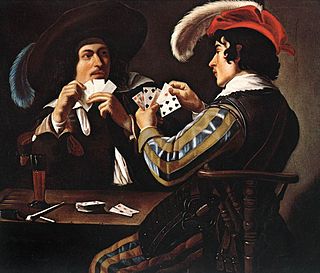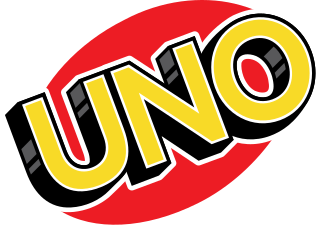
Mao is a card game of the shedding family, in which the aim is to get rid of all of the cards in hand without breaking certain unspoken rules. The game is from a subset of the Stops family and is similar in structure to the card game Uno or Crazy Eights.
President is a westernized version of an originally Japanese card game named daifugō or daihinmin. It is a game for three or more, in which the players race to get rid of all of the cards in their hands in order to become "president" in the following round. It can also be played as a drinking game. A commercial version of the game exists under the name The Great Dalmuti, with a non-standard deck.

Crazy Eights is a shedding-type card game for two to seven players. The object of the game is to be the first to get rid of all the player's cards to a discard pile. The game is similar to Switch and Mau Mau.

Cribbage, or crib, is a card game traditionally for two players, but commonly played with three, four or more, that involves playing and grouping cards in combinations which gain points. Cribbage has several distinctive features: the cribbage board used for score-keeping, the eponymous crib, box, or kitty —a separate hand counting for the dealer—two distinct scoring stages and a unique scoring system including points for groups of cards that total fifteen. It has been characterized as "Britain's national card game" and the only one legally playable on licensed premises without requiring local authority permission.
Ninety-nine is a card game for 2, 3, or 4 players. It is a trick-taking game that can use ordinary French-suited cards. Ninety-nine was created in 1967 by David Parlett; his goal was to have a good 3-player trick-taking game with simple rules yet great room for strategy.

Forty-Fives is a trick-taking card game that originated in Ireland. The game is popular in many communities throughout Atlantic Canada as well as the Gaspé Coast in Québec. Forty-fives is also played in parts of Massachusetts and southern New Hampshire in New England, United States, as well as in the South Island of New Zealand.
Thirty-one or Trente et un is a gambling card game played by two to seven people, where players attempt to assemble a hand which totals 31. Such a goal has formed the whole or part of various games like Commerce, Cribbage, Trentuno, and Wit and Reason since the 15th century.
The game of Bartok, also known by a number of other names, such as Wartoke, Warthog, Bartog, Bentok, Last One Standing or Bong 98, is a card game where the winner of each round invents a new rule which must be obeyed for the remainder of the game. It belongs to the "shedding" or Crazy Eights family of card games, whereby each player tries to rid himself of all of his cards. The game progresses through a series of rounds with a new rule being added in each round, thus making the game increasingly complex as it progresses. These newly introduced rules may modify any existing rules.
Golf is a card game where players try to earn the lowest number of points over the course of nine deals. It is a game for four or more players using a double-deck of 108 cards, and has little in common with its solitaire cousin.
Speed is a game for two players or more of the shedding family of card games, in which each player tries to get rid of all of his or her cards first.
Free Parking is a Parker Brothers card game inspired by the "Free Parking" space of the Monopoly board game.

Craits is a shedding card game for two to five players. It was invented in the 1970s in Cambridge, Massachusetts, and is derived from Crazy Eights, which forms the origin of its name.
Uno Attack is one of many variations on the popular Mattel card game Uno. It includes 112 cards as well as a mechanical card launcher. It first launched in the spring of 2003.

Pyramid or beeramid is a card game that is most commonly used as a drinking game requiring 1 standard deck of playing cards. This game is also referred to as Bullshit Pyramid.

Ninety-nine is a simple card game based on addition and reportedly popular among the Romani people. It uses one or more standard decks of Anglo-American playing cards in which certain ranks have special properties, and can be played by any number of players. During the game, the value of each card played is added to a running total which is not allowed to exceed 99. A player who cannot play without causing this total to surpass 99 loses that hand and must forfeit one token.
A shedding-type card game is a game in which the player's objective is to empty one's hand of all cards before all other players. Popular card games of this type include:
Buraco is a Rummy-type card game in the Canasta family for four players in fixed partnerships in which the aim is to lay down combinations in groups of cards of equal rank and suit sequences, there being a bonus for combinations of seven cards or more. Buraco is a variation of Canasta which allows both standard melds as well as sequences. It originated from Uruguay and Argentina in the mid-1940s, with apparent characteristics of simplicity and implications that are often unforeseeable and absolutely involving. Its name derives from the Portuguese word "buraco" which means “hole”, applied to the minus score of any of the two partnerships. The game is also popular in the Arab world, specifically in the Persian Gulf; where it is known as 'Baraziliya' (Brazilian).
Russian Schnapsen or Thousand Schnapsen is a trick-taking game for three players, the aim of which is to score over 1000 points to win the game. It is a variant of the popular Austrian game of Schnapsen. Like its parent, Russian Schnapsen features "marriages" which are worth extra points.

Kings Reverse is a card game for 2 or more players that is played in Iowa, in the United States. For more than 5 players, 1 additional pack of cards may be used. Whoever gets rid of his/her cards first wins the game. Kings Reverse is very similar to the games Uno and Flaps, both belonging to the larger Crazy Eights or shedding family of card games. However Kings Reverse is played with regular packs of playing cards.









